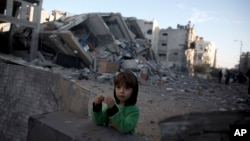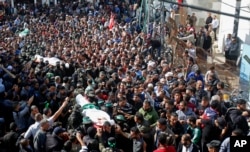A cease-fire in Gaza between Israel and the militant group Hamas was holding Tuesday night, but tough talk from both sides indicate hostilities could erupt again at any time.
Egypt brokered the cease-fire after two days of the worst fighting in Gaza since the 2014 war.
Seven Palestinians, mostly militants, were killed and more than two dozen wounded.
An Israeli soldier was also killed in a gunfight with Hamas.
Palestinian rocket fire killed one Israeli civilian and wounded more than 30. Israel says more than 400 rockets were fired into Israel from Gaza, with about 100 intercepted.
Israel retaliated with airstrikes that destroyed several major Hamas buildings, including the intelligence headquarters and television station.
Hamas says it will abide by the cease-fire, but warns its "hands are on the trigger" if Israel violates it.
Palestinians, who regarded the latest fighting against Israel as a victory, celebrated in the streets.
"We taught the enemy a harsh lesson and made it pay for its crimes," a Hamas spokesman said.
At the same time, Israeli security minister Yuval Steinitz says Israel "landed a harsh and unprecedented blow on Hamas and the terrorist groups in Gaza and we will see if that will suffice or whether further blows will be required."
But Israelis did not celebrate. Many call the cease-fire a disgrace and a capitulation to terrorists.
State Department spokeswoman Heather Nauert says the United States "condemns in the strongest terms the rocket, missile and mortar attacks that are taking place from Gaza into Israel ... we stand with Israel as Israel defended itself against these attacks. It is simply unacceptable to target civilians."
A failed Israeli military operation apparently targeting a Hamas commander inside Gaza triggered the latest fighting.
Palestinians have been holding months of weekly protests along the Israeli-Gaza border, demanding Israel ease a long-standing blockade of Gaza. They also want the right of return to lands they say Israel stole when the Jewish state was founded in 1948.
Israel has accused Hamas of using the noisy protests as a cover for militants to sneak into Israel.
Last week, Israeli Prime Minister Benjamin Netanyahu allowed Qatar to transfer $15 million in aid to Gaza as part of his efforts to avoid another all-out war.
"I'm doing what I can, in coordination with the security establishment, to return quiet to the southern communities, but also to prevent a humanitarian crisis," Netanyahu told his ultra-right critics. "I think we're acting in a responsible and wise way."
In exchange, Hamas had agreed to scale back the protests along the border with Israel.






